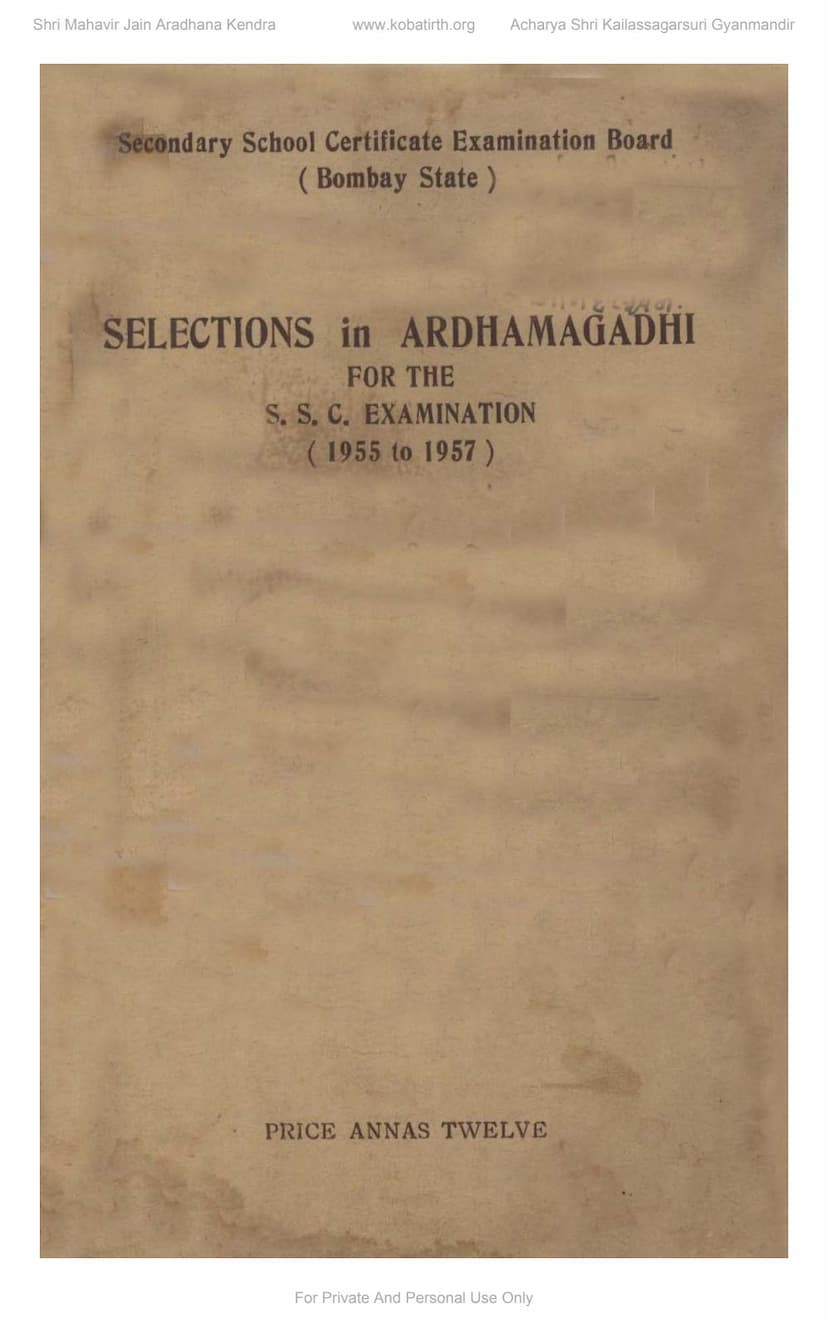Selections In Arddhamagadhi For SSC Examinations
Added to library: September 2, 2025

Summary
This document is a compilation titled "Selections in Arddhamagadhi For SSC Examinations," published by Venus Book Stall in Poona, likely for the Secondary School Certificate (SSC) Examination Board of Bombay State, covering the years 1955 to 1957. It is intended for private and personal use only and is specified as not to be used in any except Standard XI of a Secondary School.
The book contains a selection of texts written in the Arddhamagadhi language, which is an ancient Prakrit language often associated with Jain scriptures. The selections are divided into two main categories: Prose and Poetry.
Prose Selections:
The table of contents lists eight prose selections:
- अज्जचंदणा कहाणयं (Ajjachandanā Kahāṇayaṁ): This appears to be a story about a queen named Chandana, detailing her virtuous conduct and how she came to be known by that name. It describes her kindness and the respect she garnered. The excerpt provided details a situation where her mother-in-law, envious of Chandana's good treatment by her husband, the merchant, plots against her, leading to Chandana's hair being shaved off. The story then follows Chandana's resilience and how she ultimately triumphs.
- दोमुहो (Dōmuhō): This is a story about King Dōmuha, who acquired a gem that gave him two heads. The story involves his desire for a special hall of painting, the discovery of the gem while digging, and the subsequent events, including a conflict with King Chandpajyota of Ujjain over the gem.
- मायंगरिसी (Māyaṅgarisī): This prose selection details the life and teachings of a sage (Māyāṅgarishi). It narrates his journey from a king named Shankha who renounced worldly pleasures to become a Jain monk. It describes his experiences in different lifetimes, including being born as an elephant (Māyāṅga), highlighting the consequences of pride in one's lineage.
- अणणुओगो (Aṇanuōgō): This story seems to focus on the concept of "anuyoga," which relates to following instructions or teachings correctly. It narrates the tale of a boy who learns the importance of precise and appropriate actions through various experiences.
- अभयदानं (Abhayadānaṁ): This piece deals with the concept of "giving protection" or "granting fearlessness." It likely tells a story where someone is offered protection, possibly from a king or a compassionate individual.
- सव्वकामियं पडणं (Savvakāmiyaṁ Paḍaṇaṁ): This likely refers to a practice or vow that fulfills all desires. The text describes a story about an elephant and a parrot, and how they attained a celestial state.
- वक्कलचीरि-कहाणयं (Vakkalchīri-Kahāṇayaṁ): This is a story about a king named Prasannachandra and his queen Dharini. It narrates how their son was raised as a "bark-clad" ascetic (Vakkalchīri) after the king renounced his throne. The story highlights family relationships, renunciation, and eventual recognition.
- सागडियस्स उद (Sāgaḍiyassa Uda): This title suggests a story related to a cart-driver or a cart. The excerpt provided involves a cart-driver selling a "cart-partridge" to a merchant, leading to a dispute over the sale.
Poetry Selections:
The table of contents also lists six poetry selections:
- एलयं (Ēlayaṁ): This likely refers to a poem or a collection of verses, possibly about a specific theme or character.
- सीयाहरणं (Sīyāharaṇaṁ): This is a poetic rendition of the abduction of Sita, a prominent event in the Ramayana.
- चत्तारि पुत्ता (Cattāri Puttā): This likely refers to a story or poem about four sons, perhaps highlighting their different qualities or destinies.
- सिलामेह - विवाहो (Silāmeh - Vivāhō): This section seems to focus on the marriage of Silameha, possibly a significant event in a larger narrative.
- पाइय - भासा (Pāiya - Bhāsā): This section is dedicated to the Prakrit language (Pāiyā) itself, discussing its characteristics, beauty, and comparison with Sanskrit.
- सुभासियाई (Subhāsiyāi): This section comprises a collection of wise sayings, proverbs, or aphorisms, offering moral and ethical guidance.
In essence, the book serves as a study material for students preparing for the SSC examination, introducing them to classical Jain literature in the Arddhamagadhi language through a collection of diverse stories and poems that likely convey religious, moral, and cultural themes prevalent in Jain tradition.